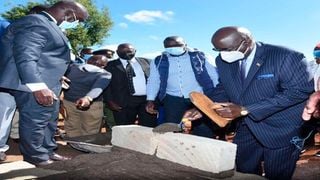
Education Cabinet Secretary Prof George Magoha lays a foundation stone for classrooms for junior secondary school at St Patrick’s Iten High School in Elgeyo Marakwet County during his visit on January 8, 2022. Looking on is the school’s Principal Peter Rotich.
| Jared Nayataya | Nation Media GroupEducation
Premium
Concern as junior high costs missing in new budget
The Education ministry has asked Parliament to recommend and approve allocation of additional funds to cater for junior secondary school students in January next year as cash for the students has been left out in the 2022/23 budget.
In their response to the National Assembly Education and Research committee on the Budget Policy Statement (BPS) 2022, Basic Education Principal Secretary Julius Jwan and his Implementation of Curriculum Reforms counterpart Fatuma Chege said the rollout of junior secondary could be paralysed if the government fail to budget for tuition.
“No capitation has been allocated to go to junior secondary school students in the budget estimates for the 2022/23 financial year,” said Dr Jwan. Only cash for classrooms was allocated.
There are 1,403,980 Grade Six learners, now at Grade Five, who are expected to transit to junior secondary in January next year.
The ministry has proposed that MPs recommend and approve Sh28 billion to cater for Grade Seven students.
Prof Chege said junior secondary students will be hosted in secondary schools as recommended in the CBC taskforce report and that requires government’s funding.
The PS said only primary schools sharing the same compound with secondary schools and have extra classrooms may be considered to host learners in junior secondary school.
“For those that may be hosted in primary schools, we shall create a separate wing from the primary schools. Their management will also be that of secondary schools,” Prof Chege told the committee chaired by Busia Woman Rep Florence Mutua.
She said the construction of over 10,000 classrooms in secondary schools is ongoing and expected to end in April.
More funding is required to ensure more classrooms are built to facilitate a smooth roll-out of the Competency Based Curriculum (CBC), Prof Chege said.
The ministry has also requested more funding to sustain free day education. Dr Jwan said in 2022/23, his department intends to disburse Sh12.41 billion under free primary capitation to 8700,000 learners in public primary schools at a rate of Sh1, 420 per learner.
They will also distribute 6,288,653 sanitary towels to 898,379 in targeted primary schools and that will require Sh270 million, but only Sh200 million has been allocated.
Under free day secondary education (FDSE), Dr Jwan said the ministry intends to disburse capitation to 4,381,701 students at the rate Sh22,244 per learner. He, however, said the programmes have been underfunded. In the FDSE, only Sh64.42 billion has been allocated against a requirement of Sh74.53 billion, creating a deficit of Sh10.11 billion.
Funding for the construction of CBC classrooms has been cut by half. “This was a presidential directive to construct 10,000 classrooms at a cost of Sh8 billion. In the current financial year, the Treasury approved Sh4 billion. But in the 2022/23 financial year, only Sh2 billion has been approved, instead of the Sh4 billion required to cater for infrastructure at junior secondary,” said Dr Jwan.





